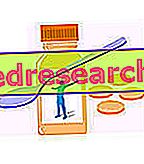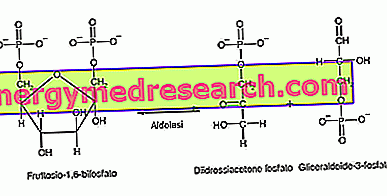Definition
The stuffy nose (or nasal congestion) is a very common airway disorder in which, due to an accumulation of mucus in the nasal cavity, the affected subject complains of difficulty in inhaling oxygen from the nose.
Causes
The stuffy nose is the immediate expression of an inflammatory process on the nasal lining tissues which, inevitably, favors the accumulation of mucus in the nose.
The stuffy nose is related to numerous diseases or pseudo-pathological conditions: allergies, deviation of the nasal septum, smoking, pregnancy, flu, enlargement of the adenoids, nasal polyposis, rhinitis and sinusitis.
Symptoms
The characteristic symptom of nasal congestion is the difficulty of inhaling oxygen through the nasal cavities. In addition to dyspnea, a stuffy nose can cause: sleep apnea, speech deficiency, hearing difficulties, hypoxia, tearing, headache, general malaise, poor quality sleep, cough.
Information on Closed Noses - Drugs for the Treatment of Closed Noses is not intended to replace the direct relationship between health professional and patient. Always consult your doctor and / or specialist before taking Nose Closed - Nose Closed Medication.
drugs
Every individual, at least once in a lifetime, is suffering from nasal congestion. The stuffy nose, in fact, constitutes a very common disorder, a recurrent symptom in many diseases. Fortunately, a stuffy nose is generally a transient condition, which can vanish even without the help of specific drugs or treatments. However, on the occasion of a persistent or particularly annoying nasal congestion, the opinion of the doctor is advised, essential to guide the affected patient towards the most adequate care.
The therapy depends on the cause that arises at the origins of the stuffy nose. For example, we have seen that the cold is always characterized by the accumulation of mucus in the nasal cavities; consequently, the administration of antipyretic and anti-inflammatory drugs (NSAIDs) - favoring the healing of the disease - also facilitates the release of the nose from excess mucus.
Still, the stuffy nose is a distinctive symptom of seasonal allergies and allergic rhinitis: in similar situations, the administration of antihistamines, possibly associated with corticosteroids, is particularly effective.
Regardless of the triggering cause, decongestant drugs are particularly indicated for the treatment of the stuffy nose, that is any substance capable of limiting the flow of blood to the nasal cavity.
In general, natural remedies can be used for the treatment of the stuffy nose: given the very low severity of the disease, it is sometimes possible to forgo the use of active synthetic ingredients (drugs) to the benefit of natural ones. The fumigations enriched with anti-inflammatory, antiseptic, decongestant, expectorant and antioxidant substances speed up the healing time of the stuffy nose.
The natural "drugs" most indicated for this purpose are derived from: witch hazel, bitter orange, ephedra, eucalyptus, lavender, lemon and mint.
Decongestant drugs: the abuse of these drugs can paradoxically worsen the symptoms of the stuffy nose, as well as causing insomnia, irritability and headaches. Do not use these active ingredients for more than 4-5 consecutive days.
NASAL SPRAY
- Oximetazoline hydrochloride, 0.025-0.05% solution (eg Vicks sinex, Oxilin, Equimet): apply 4-6 sprays in each nostril twice a day, as needed, for the 0.025% solutions and 2-3 applications for each nostril twice daily for 0.5% solutions.
- Chromoglycated sodium (eg Lomudal Nasale) It is recommended to take the drug (4% solutions) at the posology of a spray per nostril, 2-4 times a day.
ORAL ADMINISTRATION
- Pseudoephedrine (eg. Actifed, Actigrip): pseudo-ephedrine is probably the most widely used drug in therapy as a nasal decongestant; the active ingredient is used both in combination with other drugs (eg antihistamines, Paracetamol), and in monotherapy. Pseudoephedrine stimulates the release of norepinephrine, thus producing a good constricting effect on blood vessels. Begin therapy by taking 30-60 mg of the drug orally every 4-6 hours, as needed. Continue therapy by taking 120 mg of active twice daily. Do not exceed 240 mg a day. Consult your doctor.
Antihistamine drugs to clear the stuffy nose due to allergies
NASAL SPRAY
- Azelastine (eg Lasticom, Allespray): spray the drug (0.1%) once or twice per nostril, twice a day. For chronic forms of stuffy nose on an allergic basis, the dosage of the drug (0.15% solution) involves applying two sprays for each nostril, twice daily.
OARAL ADMINISTRATION
- Desloratadine (Es. Neoclarityn, azomyr, aerius): this is a drug widely used in therapy for the care of the stuffy nose associated with allergic rhinitis and seasonal allergies. It is recommended to start therapy by taking 5 mg of the drug orally, once a day; always continue with the same indication. The duration of therapy should be established by the doctor based on the response to the treatment and the severity of the condition.
- Hydroxyzine (eg Atarax): the drug is an antihistamine, anxiolytic and sedative, to be used also in case of allergic reactions associated with a stuffy nose. It is recommended to take the drug at a dose of 25 mg orally (or intramuscularly), 3-4 times a day.
- Cetirizine (eg Rinalgit, Leviorinil, Reactine, Suspiria, Zyrtec): available both in tablets to be swallowed and in chewable sweets. It is recommended to take 5-10 mg of active per day.
Corticosteroid drugs to treat the stuffy nose due to allergic rhinitis
Indicated in the event of failure to respond to the use of decongestants and antihistamines for the treatment of the stuffy nose associated with allergies. The use of corticosteroids is also indicated in cases of non-allergic rhinitis. Don't forget that these drugs can induce nausea, digestive disorders, headaches and joint pains.
NASAL SPRAY
- Fluticasone (eg. Avamys, Fluspiral, Flixonase, Nasofan): start the treatment by applying two sprays of drug per nostril twice a day (dose per nostril: 50 mcg; total dose: 200 mcg). The dosage can be reduced by half (one spray per nostril once a day) to improve symptoms. Do not exceed 200 mcg per day.
- Mometasone (eg. Nasonex, Rinelon): indicated for the treatment of the stuffy nose on an allergic basis. Apply two sprays per nostril once a day.
ORAL ADMINISTRATION
- Prednisone (eg. Deltacortene, Lodotra): to treat the symptoms of medium and severe entities associated with the stuffy nose on an allergic basis, it is recommended to take the drug at the indicative dose of 20-30 mg. Consult your doctor before taking this medicine.
Drugs to clear the stuffy nose in the context of cold and flu
- Antibiotics: the administration of antibiotics is indicated when the stuffy nose depends on a bacterial infection. Take this medicine only with a prescription. The most used drugs are:
- amoxicillin (eg. Augmentin, Klavux): the drug is particularly useful in case of pyrethrine strep infections
- clarithromycin (eg Biaxin, Macladin, Klacid, Soriclar, Veclam), useful for eradicating the infection sustained by Haemophilus influenzae
- Azithromycin (eg Azithromycin, Zitrobiotic, Rezan, Azitrocin)
- Antivirals: indicated only in the case of a stuffy nose due to a viral infection. The drugs fully exert their therapeutic effect if taken no later than 2 days after the onset of symptoms. Some of the most used drugs are:
- Amantadine (eg Mantadan), Rimantadina (eg Flumadine)
- Zanamivir (ex. Relenza)
For the dosage: consult a doctor.
- Paracetamol or acetaminophen (eg tachypirine, efferalgan, panadol, Piros, Tachidol): the administration of this drug is useful for lowering fever, a symptom that often accompanies a stuffy nose. Paracetamol is administered at a dosage of 325-650 mg per day every 4-6 hours; alternatively, take 1 gram every 6-8 hours. The dosage depends on the patient's condition, age and weight. In the case of a cold, cough and stuffy nose, it is possible to take a combination of paracetamol and codeine (eg codamol).
- Acetylsalicylic acid (eg. Aspirin, vivin c, Ac Acet, Carin, Salicin): the drug, INDICATED FOR ADULTS ONLY, should be taken at a dosage of 325-650 mg / day, orally or rectally, every 4 hours, when needed (do not exceed 4 grams per day). The administration of the drug to children under the age of 12 can cause serious side effects, such as Reye's syndrome, liver dysfunction and brain changes.
- Ibuprofen (eg. Brufen, moment, Subitene): take an oral dose of 200-400 mg (tablets, effervescent sachets) every 4-6 hours, as needed.
Respecting the dosages just reported guarantees rapid relief of symptoms, including a stuffy nose.



